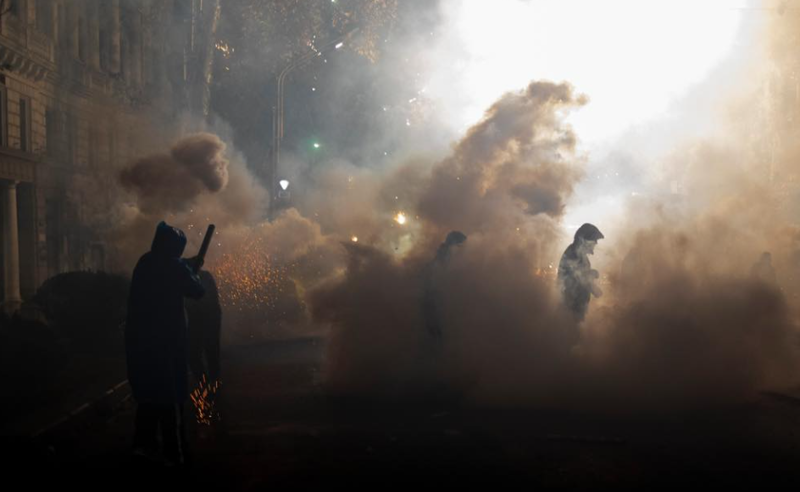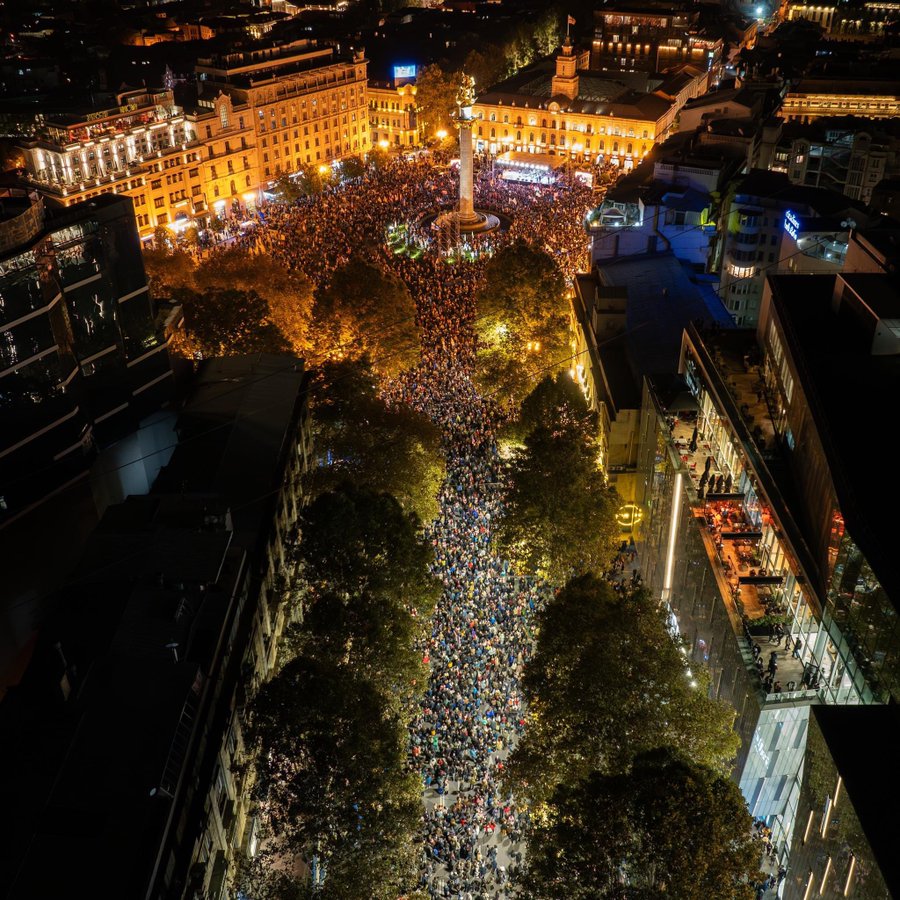Welcome to The Debrief, from the editors at Factal. Each month, we reflect upon an impactful yet underreported story that has significant regional or global implications. We’ll examine how the story has progressed and how Factal’s coverage has shifted to ensure we are always supplying our members with the most up-to-date, accurate, factual reporting.
If you like what you’re reading, sign up to receive The Debrief in your inbox on the first of every month here.
A Georgian dream unravels
For nearly two years, the people of Georgia have been protesting against decisions taken by the ruling party Georgian Dream that appear to set the country firmly on a pro-Russia path instead of a once-assured European Union integration. However, western sanctions appear to have given the government a reason for the gloves to come off as it cracks down against dissent.
Georgians protesting against an increasingly ostensible pro-Russian tilt in governance by the ruling party are all too familiar with the consequences of pushing back on Moscow’s overreach. Many have lost loved ones in nationalist rallies supporting Georgian sovereignty from a disintegrating Soviet Union in the early 1990s. Despite this, almost every weekend, tens of thousands of Georgians are braving increasingly violent police crackdowns to protest against legislations that erode their rights and their aspiration, set in the constitution, to join the European Union.
The most recent demonstrations in Tbilisi, which have garnered tens of thousands of people, have been against the ruling party Georgian Dream’s decision to suspend negotiations with the EU over joining the bloc for at least four years, despite the country achieving EU candidate status in 2023.
This decision, announced by Prime Minister and Georgian Dream Party Chairman Irakli Kobakhidze, came after the European Parliament rejected the Oct. 26 parliamentary election results, citing “significant irregularities.” Georgian Dream then accused the bloc of “blackmail and manipulation,” outraging both the opposition and the pro-European public, forcing them to the streets in demonstration.
“The Georgian Dream exercised an odd ideology for years, where despite their domestic inclinations, they retained a pro-EU posture… and it wasn’t until the foreign agents bill where that strongly broke,” Factal’s Europe lead Alex Moore said. “The pro-EU population knew this bill explicitly targeted pro-democracy human rights NGOs that received Western funding, closely mirroring a Russian law.”
This law, dubbed the “Foreign Agents law”, essentially requires all media and non-profit organizations that receive more than 20 percent of its funding from abroad to register as such, and was passed in May 2024 despite months of public backlash.
However, Georgian Dream has denied forging closer ties with Moscow, with party member and Foreign Minister Maka Botchorishvili asserting Georgia remains committed to the EU, but this stance is seen as duplicitous by many now. While Russia refused to comment directly on Tbilisi’s souring relationship with the EU, calling it “internal affairs,” the Kremlin did take to comparing the protest to the 2014 Euromaidan unrest in Ukraine, which saw the ousting of the then Russia-backed Ukrainian president Viktor Yanukovych. Putin annexed Crimea later that year.
“…This is Georgian Dream and the interior ministry taking the gloves off.”
“The nature of the protests remains largely unchanged but the response has intensified quite a bit over the past few weeks in the wake of the suspension of EU talks… again, more Ukraine parallels, as we’ve seen a steady uptick in reports of unmarked police, paramilitary police exercising extreme violence toward protesters. This kind of mirrors the 2014 Euromaidan protests.” Moore said.
The comparisons between Georgia and Ukraine are not to be taken lightly, as evident in the pressure maintained by Georgian protesters; both countries have had their own color revolutions to orient themselves away from the former imperial ruler. Russia effectively annexed Georgia’s breakaway regions in 2008 and Ukraine’s Donbass and Crimea in 2014 before deepening its footprint in 2022 by occupying Kherson and Zaphorizhia as well.
Politicians such as former President Salome Zourabichvili who once worked with the Georgian Dream are also challenging its mandate – even as her largely ceremonial position came to an end after the appointment of her successor Mikheil Kavelashvil, a former soccer player. Thousands protested during his inauguration on December 29. Zourabichvili has rallied the informal opposition, the military and lawyer groups as part of her bid to demand the government announce fresh parliamentary elections before the end of the year, potentially setting the ruling party up for further dissent against its rule.
“The Georgian Dream exercised an odd ideology for years, where despite their domestic inclinations, they retained a pro-EU posture… and it wasn’t until the foreign agents bill where that strongly broke.”
Since the beginning of the most recent wave of protests in late November, hundreds of people have been detained – many alleging severe beatings in custody – and the opposition harassed. Amnesty International has documented the use of unlawful force by police, including chemical irritants in water cannons and the targeting of journalists. Non-governmental organizations found detainees were forced to handover their cellphones and passwords, with data showing the devices were used in buildings belonging to state agencies.
“There’s been an uptick in reports of [such] in Georgia, whereas previously entire weeks would go by without tear gas with largely peaceful protests outside of Parliament – that’s kind of gone out of the window,” Moore said. “It largely coincides with the suspension of EU talks and the subsequent suspension of strategic partnerships between Georgia and the US and UK; this is Georgian Dream and the interior ministry taking the gloves off.”
The crackdowns did not go unnoticed by the European Union. The bloc’s European Commission has proposed to the Council the suspension of visa-free travel for Georgian officials. Stronger measures such as sanctions against Georgian officials over brutality against protesters or suspending accession talks were reportedly blocked by Georgian Dream allies Hungary and Slovakia.
“Any further unraveling of tangible relationships between Georgia and the West has a clear, in my opinion, causal effect on how Georgian authorities respond to protesters,” Moore said. “I would continue to watch for any escalation and increased reports of unmarked paramilitary police being on the ground or any uptick in escalation of violent measures toward protesters because, as we saw in Ukraine with Euromaidan, those are the things that only further entrench the resolve of the protesters and ultimately led to the revolution that ousted Yanukovych.”
Written by Halima Mansoor. Edited by Bada Kim
Further reading:
- Review Factal’s coverage of the Georgian government crisis on our topic page (members link)
- Human Rights Watch report on police brutality during recent Tbilisi protests
- This overview of the 2003 Rose Revolution in Georgia
- Read this HRW report on Russia’s involvement in Abkhazia’s breaking away from Georgia

Thanks for reading! If you enjoyed this edition, sign up here to receive The Debrief in your inbox on the first of every month.
Top photo: Thousands of Georgians gather at a pro-European rally at Tbilisi’s Freedom Square on Oct. 20, a week before parliamentary elections that saw the ruling party Georgian Dream retain power amid accusations of electoral fraud. (Image: X/Coalition4Change)
Factal gives companies the facts they need in real time to protect people, avoid disruptions and drive automation when the unexpected happens.
Try Factal for free or talk with our sales team (sales@factal.com) for a demo.

